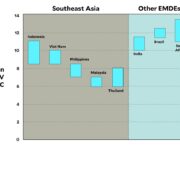Brand trust vs brand love: What makes brands last

Love makes people notice your brand. Trust makes them stay.
Yet many companies chase “brand love” as if it were the endgame, pouring budgets into viral campaigns, celebrity tie-ups and grand launches.
But affection built on hype is fragile. One crisis, one bad review, one broken promise—and that love vanishes.
In the Philippines, this distinction matters even more. Filipino consumers are passionate yet discerning. They admire, but they walk away when disappointed. Years of overpromising ads and inconsistent service have made them cautious.
In an environment of short attention spans and endless options, emotion alone rarely sustains loyalty.
Emotion vs logic
Brand love is emotional, built on passion and aspiration. It drives excitement and advocacy. But it’s fleeting. One misstep and affection turns to apathy.
Brand trust, on the other hand, is logical—earned through reliability, integrity and consistency over time. It grows slowly but endures through crises and competition.
Love attracts. Trust retains.
2 contrasting stories: Lily’s Peanut Butter and Samsung Galaxy Note 7
Lily’s Peanut Butter is a quiet force. No celebrity endorser, no massive campaigns—just 60 years of being present on Filipino tables. It thrives not on hype but on heritage, consistency and familiarity.
In contrast, the Samsung Galaxy Note 7 launched to global admiration in 2016. Consumers loved its innovation until reports of exploding batteries surfaced. Airlines banned it. Sales halted. Trust evaporated overnight. No amount of love could override fear.
Yet Samsung didn’t disappear. Instead, it rebuilt credibility step by step, a process we call the Trust Flywheel.
How Samsung rebuilt trust: The Trust Flywheel
The Note 7 crisis could have ended Samsung’s dominance. Instead, the company turned disaster into a masterclass in restoring trust.
1. Humility: Samsung took full responsibility. Public apologies were issued, and 2.5 million units were recalled. Safety came before profit.
2. Cultural literacy: The company localized its response. A firmware update limited charging to 60 percent during the recall, balancing safety with convenience, especially in markets like the Philippines, where phones are lifelines.
3. Empathy: Customers were inconvenienced and Samsung acknowledged it, offering full refunds or exchanges.
4. Transparency: Over 700 engineers tested 200,000 devices and 30,000 batteries. Results were shared publicly, rebuilding credibility through openness.
5. Authenticity: Postcrisis communication matched action. No PR spin, just honesty.
6. Consistency: A new eight-point battery safety check became part of every future product. Later launches proved this was not token compliance but embedded change.
7. Accountability: Samsung absorbed the full financial and reputational cost without shifting blame.
By early 2017, just months after the recall, Samsung regained its No. 1 position in global smartphone sales. That rebound wasn’t luck. It was trust, rebuilt and rewarded.
The anatomy of trust: 3 dimensions, 7 signals
Trust isn’t a campaign. It’s an ecosystem built when beliefs, words and actions align. Together with anthropologist Chiqui Escareal-Go, we decoded seven repeatable trust signals across three dimensions:
1. Internal values: Humility, cultural literacy, empathy
Define who the brand truly is. These values shape how it listens, learns and responds. Without them, initiatives risk being performative.
2. Transparency—The bridge
Make internal values visible—no ifs, no buts. By openly sharing successes, setbacks and decisions, it turns intention into credibility.
3. External Behaviors—authenticity, consistency, accountability
These are promises in action: reliable service, truthful communication, responsible conduct. Without aligned values and transparency, even genuine acts can appear hollow.
In short:
- Values reveal what a brand stands for.
- Transparency proves those values are real.
- Behavior delivers them in practice.
The Trust Flywheel spins when all three dimensions align. It shows how brands, organizations, and personalities can build, protect and restore trust using a strategic, repeatable framework grounded in clear behaviors, not just emotional appeal.
Every aligned action adds momentum. When values and behaviors reinforce each other, trust builds faster. Miss a step, skip a principle or act inconsistently, and the flywheel stalls. Fail completely, trust is eroded faster than it was earned.
Examples in practice
Lily’s Peanut Butter shows how quiet consistency sustains loyalty. It doesn’t need to shout. It simply delivers on its promise generation after generation.
Samsung proves that even global giants can fall, but with humility and accountability, they can rise again. Its recovery was not powered by marketing but by operational integrity.
The trust economy: Why it matters now
According to the 2025 Edelman Trust Barometer, 80 percent of global consumers now trust brands more than they trust government or media.
In the Philippines, trust isn’t assumed; it’s earned.
We live in a trust economy. Consumers don’t just buy products; they choose partners who reflect their values. Emotional marketing may spark attention, but only trust sustains it.
Trust today is operational, measurable and strategic:
- Brands that respond transparently in crises build resilience.
- Companies that deliver consistently reduce churn.
- Organizations that align internal values with external actions create lasting advocacy.
Trust also drives business outcomes. Brands with high trust ratings command price premiums and enjoy stronger retention better than those built on buzz.
Trust, in other words, isn’t just ethical; it’s profitable.
If your brand wants to survive shifts, crises and competition, don’t just aim to be loved; aim to be trusted.
Are you ready to turn your own Trust Flywheel?
Josiah Go is chair and chief innovation strategist of Mansmith and Fielders Inc. He is also cofounder of the Mansmith Innovation Awards. To ask Mansmith Innovation team to help challenge assumptions in your industries, email info@mansmith.net.

















